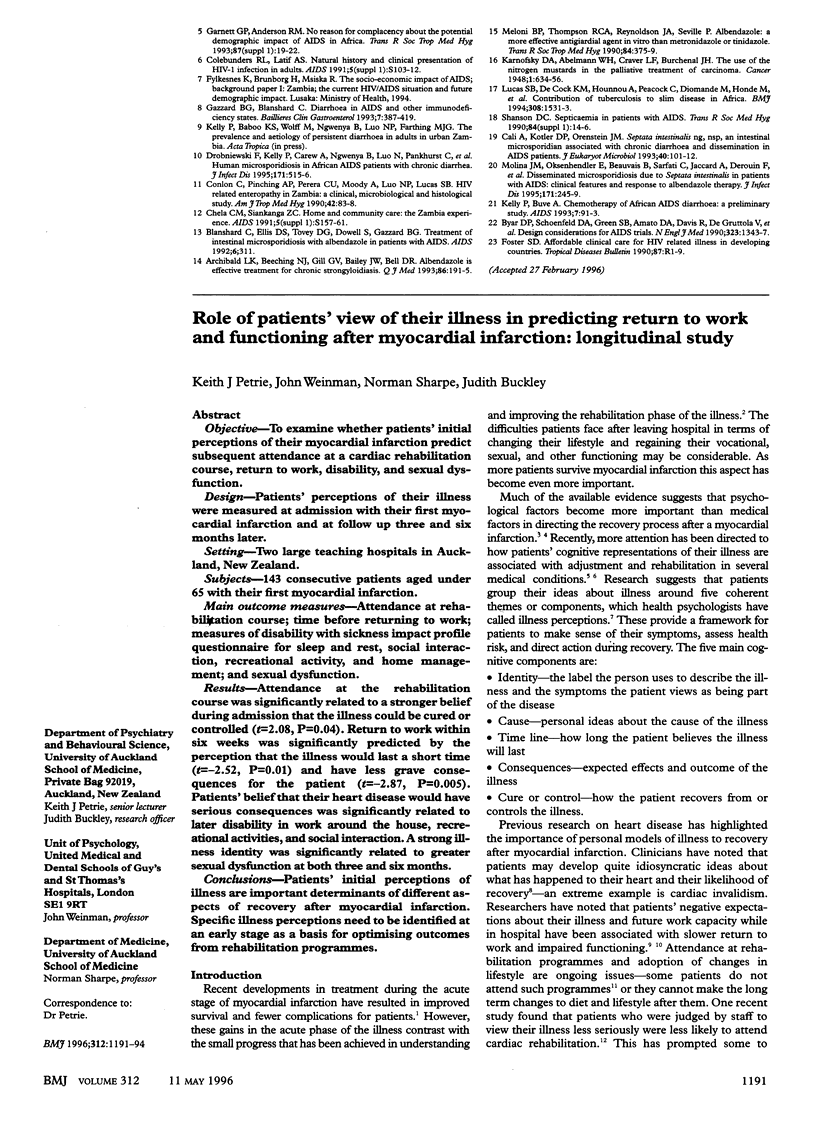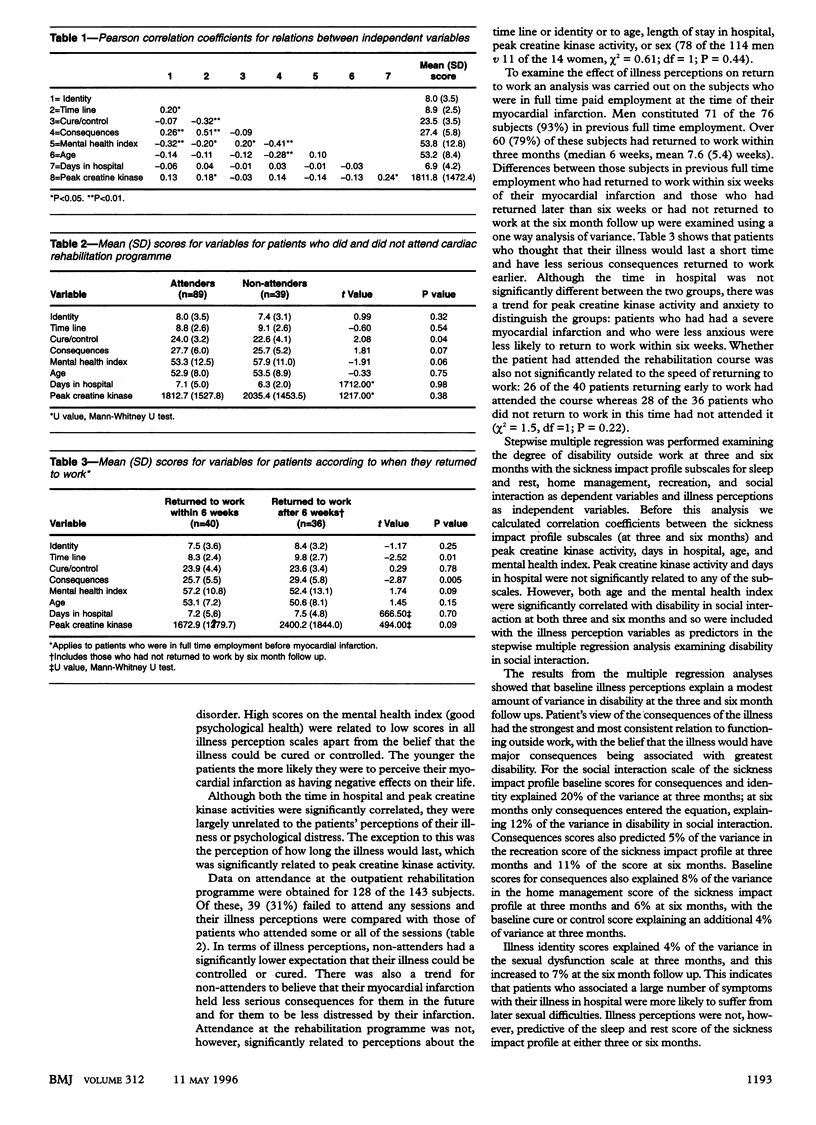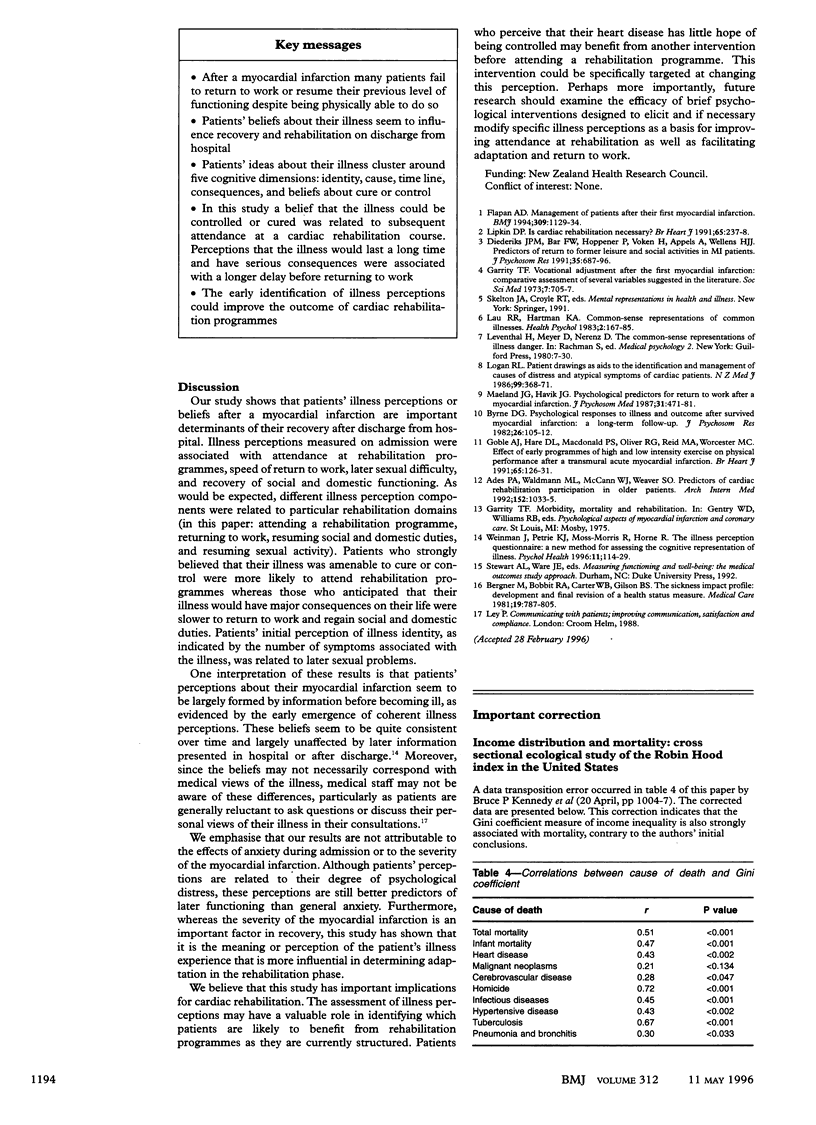Abstract
OBJECTIVE--To examine whether patients' initial perceptions of their myocardial infarction predict subsequent attendance at a cardiac rehabilitation course, return to work, disability, and sexual dysfunction. DESIGN--Patients' perceptions of their illness were measured at admission with their first myocardial infarction and at follow up three and six months later. SETTING--Two large teaching hospitals in Auckland, New Zealand. SUBJECTS--143 consecutive patients aged under 65 with their first myocardial infarction. MAIN OUTCOME MEASURES--Attendance at rehabilitation course; time before returning to work; measures of disability with sickness impact profile questionnaire for sleep and rest, social interaction, recreational activity, and home management; and sexual dysfunction. RESULTS--Attendance at the rehabilitation course was significantly related to a stronger belief during admission that the illness could be cured or controlled (t = 2.08, P = 0.04). Return to work within six weeks was significantly predicted by the perception that the illness would last a short time (t = 2.52, P = 0.01) and have less grave consequences for the patient (t = 2.87, P = 0.005). Patients' belief that their heart disease would have serious consequences was significantly related to later disability in work around the house, recreational activities, and social interaction. A strong illness identity was significantly related to greater sexual dysfunction at both three and six months. CONCLUSIONS--Patients' initial perceptions of illness are important determinants of different aspects of recovery after myocardial infarction. Specific illness perceptions need to be identified at an early stage as a basis for optimising outcomes from rehabilitation programmes.
Full text
PDF



Selected References
These references are in PubMed. This may not be the complete list of references from this article.
- Ades P. A., Waldmann M. L., McCann W. J., Weaver S. O. Predictors of cardiac rehabilitation participation in older coronary patients. Arch Intern Med. 1992 May;152(5):1033–1035. [PubMed] [Google Scholar]
- Bergner M., Bobbitt R. A., Carter W. B., Gilson B. S. The Sickness Impact Profile: development and final revision of a health status measure. Med Care. 1981 Aug;19(8):787–805. doi: 10.1097/00005650-198108000-00001. [DOI] [PubMed] [Google Scholar]
- Byrne D. G. Psychological responses to illness and outcome after survived myocardial infarction: a long term follow-up. J Psychosom Res. 1982;26(2):105–112. doi: 10.1016/0022-3999(82)90028-9. [DOI] [PubMed] [Google Scholar]
- Diederiks J. P., Bär F. W., Höppener P., Vonken H., Appels A., Wellens H. J. Predictors of return to former leisure and social activities in MI patients. J Psychosom Res. 1991;35(6):687–696. doi: 10.1016/0022-3999(91)90119-9. [DOI] [PubMed] [Google Scholar]
- Farrow S. Falling sperm quality: fact or fiction? BMJ. 1994 Jul 2;309(6946):1–2. doi: 10.1136/bmj.309.6946.1. [DOI] [PMC free article] [PubMed] [Google Scholar]
- Goble A. J., Hare D. L., Macdonald P. S., Oliver R. G., Reid M. A., Worcester M. C. Effect of early programmes of high and low intensity exercise on physical performance after transmural acute myocardial infarction. Br Heart J. 1991 Mar;65(3):126–131. doi: 10.1136/hrt.65.3.126. [DOI] [PMC free article] [PubMed] [Google Scholar]
- Lipkin D. P. Is cardiac rehabilitation necessary? Br Heart J. 1991 May;65(5):237–238. doi: 10.1136/hrt.65.5.237. [DOI] [PMC free article] [PubMed] [Google Scholar]
- Logan R. L. Patient drawings as aids to the identification and management of causes of distress and atypical symptoms of cardiac patients. N Z Med J. 1986 May 28;99(802):368–371. [PubMed] [Google Scholar]
- Maeland J. G., Havik O. E. Psychological predictors for return to work after a myocardial infarction. J Psychosom Res. 1987;31(4):471–481. doi: 10.1016/0022-3999(87)90005-5. [DOI] [PubMed] [Google Scholar]


